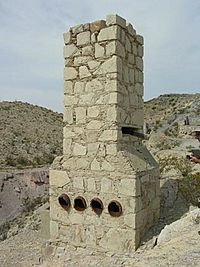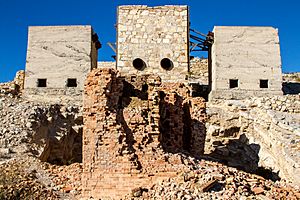Mariscal Mine facts for kids

Exhaust stack and chimney
|
|
| Location | |
|---|---|
| State | Texas |
| Country | USA |
| Coordinates | 29°05′42″N 103°11′13″W / 29.09500°N 103.18694°W |
| Production | |
| Products | Cinnabar |
| History | |
|
Mariscal Mine
|
|
| Lua error in Module:Location_map at line 420: attempt to index field 'wikibase' (a nil value). | |
| Location | River Rd., Big Bend National Park, Texas |
| Area | 640 acres (260 ha) |
| Built | 1900 |
| NRHP reference No. | 74000279 |
| Added to NRHP | September 13, 1974 |
The Mariscal Mine was a place where a special rock called cinnabar was dug up. This rock was then heated to get a shiny liquid metal called mercury. The mine is also known as the Lindsey Mine or the Ellis Mine.
You can find the Mariscal Mine inside what is now Big Bend National Park in Texas, USA. Between 1900 and 1943, this mine made about 1,400 flasks of mercury. Each flask weighed about 76 pounds (34 kg). This was almost a quarter of all the mercury made in the United States during that time!
Contents
History of the Mariscal Mine
Early Discoveries and Mining Efforts
The area around Brewster County, Texas, has lots of cinnabar ore. A rancher named Martin Solis found this mineral in the Mariscal area in 1900. This discovery led to the start of mining here.
The first person to mine here was D.E. Lindsey. He was a U.S. Immigration inspector. Lindsey took the cinnabar ore to Terlingua to turn it into mercury.
Changes in Ownership and Operations
Later, in 1905, a man named Ellis sold his part of the mine to Isaac Sanger from Dallas. Sanger started a company called the Texas Almaden Mining Company. However, his business did not last very long.
W.K. Ellis took over the Ellis Mine from 1917 to 1919. During this time, he made 894 flasks of mercury right at the mine site. After World War I ended, the price of mercury went down. So, Ellis sold the mine to William Burcham in 1919.
Expanding the Mine and Final Attempts
Burcham and his supporters from New York started the Mariscal Mining Company in 1919. They made the mercury refining process bigger at the mine. They used a special machine called a Scott furnace. The company closed down in 1923.
The last try to make mercury at the mine was by the Vivianna Mining Company. This happened in 1942. They used a new type of machine called a rotary Gould furnace. But this effort also stopped in 1944.
Life at the Mine for Workers
Most of the miners at Mariscal Mine were from Mexico. There were only three American employees. The miners built their own homes from rocks and tree branches. As they earned more money, they built stronger houses. These old homes are now just ruins.
The Vivianna Mining Company built concrete and stucco houses in 1942-43. But it seems no one ever lived in them. Working with mercury could be dangerous and affect the workers' health. Miners worked six days a week, for ten hours each day. They earned about $1 to $1.50 per shift. They bought most of what they needed from the company store at the mine.
What Remains at the Mariscal Mine Site
The Mariscal Mine refining plant is now in ruins. It is located below the main mine shaft entrance on the side of Mariscal Mountain. Most of the mining machines were sold and moved away in the 1940s and 1950s.
A lot of mercury was found inside the brick walls of the old Scott furnace. The buildings that are left have no roofs or doors. The main parts you can still see are the bins that held the ore, the furnace, the condensing chambers, and the tall chimney.
There are also many mine shafts in the area. The houses where workers lived and other buildings have either fallen apart or disappeared. The remaining structures and shafts are spread out over a large area. This historic area covers about 640 acres (259 hectares).
The Mariscal Mine was added to the National Register of Historic Places on September 13, 1974. This means it is an important historical site in the United States.
Images for kids
 | Percy Lavon Julian |
 | Katherine Johnson |
 | George Washington Carver |
 | Annie Easley |




